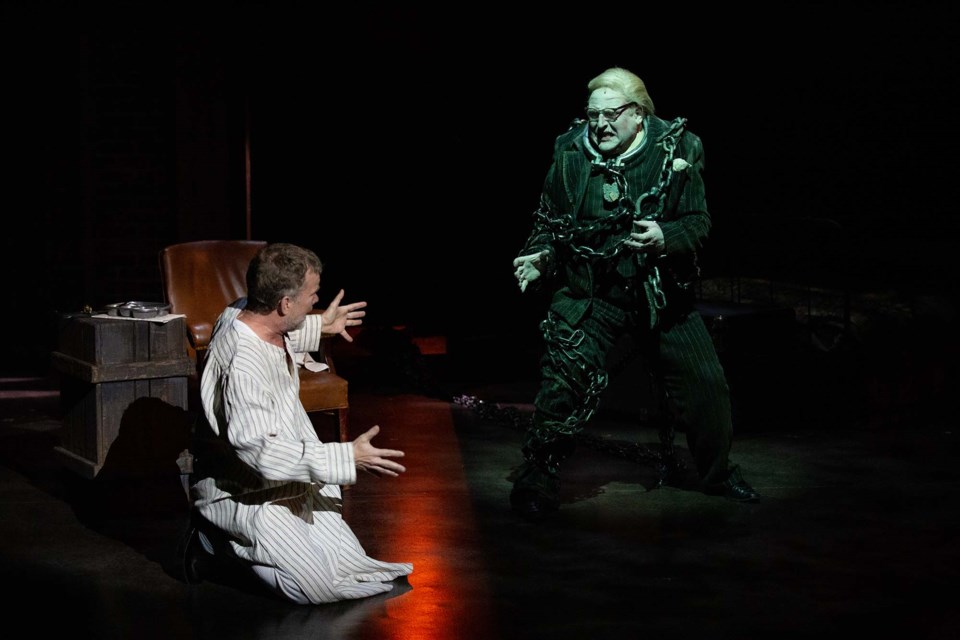REVIEW
A Christmas Carol
Runs until Thursday, Dec. 23
Maclab Theatre at Citadel Theatre
9828 – 101 Ave
Tickets: Call 780-425-1820 or visit www.citadeltheatre.ca
At first glance, the high-octane production of Citadel Theatre’s revamped production of A Christmas Carol may not be exactly what Charles Dickens purists expect. But as it unspooled, this loud, boisterous crowd-pleaser not only summoned the spirit of the author, it was exactly what theatre-goers needed after nearly two years of health restrictions.
With the collective energy of 25 actors and a budget of about $1 million to develop playwright David van Belle’s modern adaptation, it looks like a ritzy Broadway production mixed with Disney schmaltz and a heart as big as the Prairies.
Instead of 19th century England, the playwright’s revision fast-forwards to 1950s North America at Marley’s department store where last-minute shoppers scramble to purchase gifts and children sit on Santa’s lap sharing holiday wishes.
A snappish Scrooge (Ted Dykstra), Marley’s CEO, pushes maximum sales while despising the holiday season. “Christmas is an excuse to be weak,” he shouts. And when a beggar woman with a baby stretches out her hand for alms, he spouts, “Everybody is on the take.”
For decades, the aging Scrooge has lived a solitary life. His self-imposed exile from society is a double-edged sword. It made him financially wealthy, but emotionally impoverished. Afraid to love and be loved, he is oblivious to the death knell keening for his soul.
Instead of accountant Bob Cratchit, this version highlights Emily Cratchit (Patricia Zentilli), Scrooge's right-hand lieutenant and widowed mother of five children. Somehow it’s fitting that during post-Second World War, as economies are ramping up, Emily would be running a department store as efficiently as her crowded household.
As folks who live on the other side of the tracks, the Cratchits face seemingly insurmountable challenges. In addition to facing daily poverty, Emily’s son Tim is chronically ill and she has no health care. For someone in dire straits, she remains kind and compassionate and is an excellent foil to Scrooge’s hardened character.
Although the show is not advertised as a musical, the two-hour-plus production features 12 Christmas classics that were popularized during the 1940s and 1950s. Several tunes borrowed from the American songbook such as The Most Wonderful Time of the Year and Walking in a Winter Wonderland are beautifully sung by cast and magically carry us back to our Christmas traditions.
Dykstra’s interpretation of Scrooge is both canny and sensitive. He snarls his displeasure at the world’s “surplus population,” and during the spirits' visitations reveals a sense of terrifying madness. Yet he also displays a genuine concern for little Tim and humbly repents the years of neglect to his nephew Fred and his wife. Scrooge’s 24-hour journey demands a great deal from the actor and Dykstra delivers on all levels. Moreover, Dykstra nails his curmudgeonly deadpan one-liners and delivers some of the production’s finest comedic moments.
The willowy Patricia Zentilli as Emily Cratchit is the embodiment of love, joy, and peace. Zentilli gives her character strength and purpose while displaying a benevolent heart. And in the song Have Yourself a Merry Little Christmas, her lush vocals are filled with a mix of power and gentleness. It’s a shame there are limited scenes she appears in. I for one would like to see more of Zentilli’s Emily.
Julien Arnold is exceptional in his dual roles as both the spirit of Marley and Mr. Fezziwig, the store owner who first employs Scrooge. Arnold first appears as the shocking Marley with tattered hair, a green face, and body bound in chains from the weight of his sins. Instead Fezziwig is a sentimental employer who can’t stop crying during a company Christmas speech. I was struck by how Arnold quickly shifted vocal intonations, body posture, and character mental states in the space of a few scenes.
Lillia Solymos appears as the no-nonsense, but ethereal Ghost of Christmas Past. Instead John Ullyatt, wearing a green topcoat and red vest, explodes onto the stage as Ghost of Christmas Present, a flamboyant, prankster who loves a good laugh — usually at Scrooge’s expense. And Ruth Alexander deserves a nod as Mrs. Dilber, Scrooge’s housekeeper, a tough woman who endured her employer's insults for 12 years.
Designer Cory Sincennes’s set is simple and stark, and creates a smooth backdrop to the colourful, vibrant costumes. Highlighting the set is Leigh Ann Vardy’s lighting design that is particularly effective during the spirits' spooky visits. And director Daryl Cloran keeps all the diverse elements on track with a deft hand and an imaginative sense of theatricality.
Everyone describes Dickens’s story as that of a vile man who finds redemption. But it is more complex than that. Family, greed, generosity, tradition, social hierarchy, and poverty support the foundations of Scrooge’s complicated rebirth.
If A Christmas Carol doesn’t melt a humbug heart, I don’t know what will. It runs until Dec. 23.




